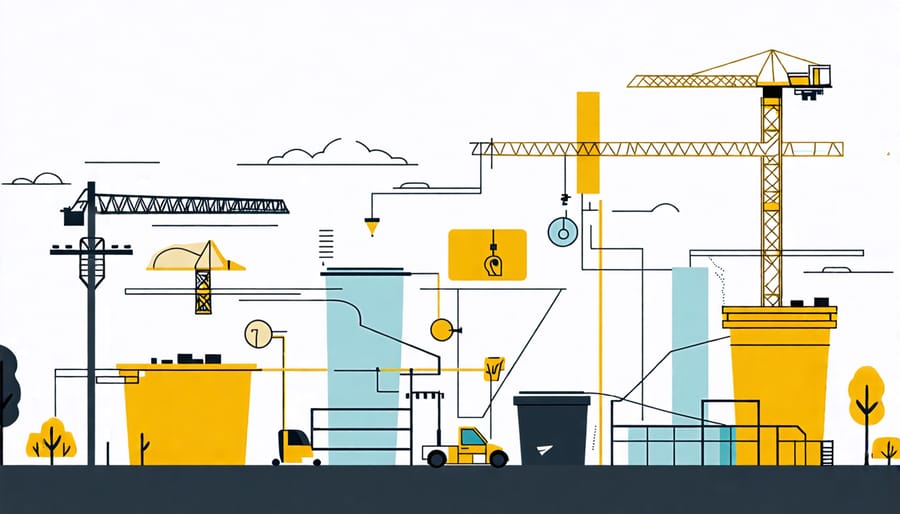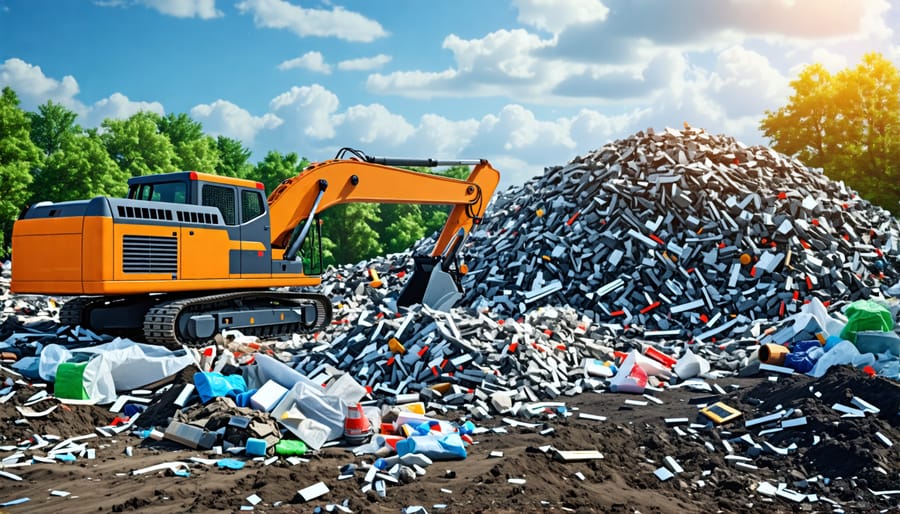Implement waste audit processes to accurately assess and categorize construction site waste streams. Identify valuable materials for recycling or reuse, and collaborate with specialized waste management companies for efficient processing. Design buildings with a focus on sustainability by integrating modular and prefabricated construction methods to reduce excess material use and minimize on-site waste. Prioritize the use of local, sustainable materials and innovative construction technologies to enhance the eco-friendliness of your projects, ensuring compliance with relevant environmental standards. Engage all stakeholders—architects, engineers, and project managers—in regular workshops and training sessions to instill a zero waste culture and continuously improve waste reduction strategies throughout the project lifecycle.
Current Landscape of Waste in Construction
Key Waste Sources in Construction
In the construction industry, key waste sources often emerge from several stages of a project, fundamentally impacting zero waste initiatives. One of the most significant contributors is material off-cuts, which occur from inaccurate measurement or over-ordering. These surplus materials not only increase costs but also generate substantial waste, highlighting the importance of precise planning and measurement. Another major source is packaging waste, commonly arising from the excessive packaging of supplies and equipment, which can be mitigated through improved coordination with suppliers to adopt more sustainable packaging solutions.
Demolition and site clearance further contribute to waste generation. These processes often involve the disposal of materials such as concrete, bricks, and metals. Implementing effective waste segregation and recycling strategies is crucial to reduce their impact. Finally, design inefficiencies, often due to a lack of integration of sustainable practices in the early stages, can lead to unnecessary waste. Emphasizing sustainable design principles and adopting circular economy practices can drastically minimize waste. By addressing these primary sources, the construction industry can better align with zero waste objectives.

Challenges in Waste Management
Reducing waste in construction projects presents several challenges that those in the industry must overcome to achieve effective zero waste initiatives. One primary obstacle is the lack of standardized practices and regulations, which can lead to inconsistencies in waste reduction efforts across different sites. Additionally, construction projects often operate under tight budgets and timelines, making it difficult to prioritize waste management without perceived costs or delays. Another significant challenge lies in the diverse range of materials used in construction. Many of these materials are not easily recyclable or require specialized disposal methods, complicating efforts to minimize waste. Furthermore, there is often a lack of awareness and training among construction workers and management about sustainable practices and the benefits of zero waste strategies. Engaging all stakeholders and fostering a culture of sustainability are crucial steps, yet they demand time and resources. Addressing these challenges requires coordinated efforts and innovations in construction processes and materials to truly embed zero waste principles into the industry.
Innovative Zero Waste Strategies
Design and Planning for Zero Waste
In the construction industry, implementing zero waste initiatives requires meticulous planning and an eye for sustainable design. To begin with, integrating waste reduction strategies at the design phase can significantly decrease the amount of waste generated during and after construction. This involves selecting materials that are both sustainable and recyclable, as well as designing modular systems that facilitate easy disassembly and reuse.
For instance, prefabrication and modular construction techniques not only enhance efficiency but also reduce waste by allowing precise control over material usage. The goal is to minimize off-cuts and scrap material by using digital modeling tools that ensure accurate measurements and require less on-site adjustment.
Moreover, engaging with expertise through expert interviews and exploring in-depth case studies of successful zero waste projects can provide valuable insights into best practices and innovative solutions. Such knowledge-sharing helps raise awareness of potential pitfalls and strategies for overcoming them.
Crucially, fostering collaboration among architects, engineers, and project managers from the onset ensures that every aspect of waste management is addressed, from sourcing materials to end-of-life disposal. This collaborative approach promotes accountability and drives commitment across the board.
By anchoring project goals around zero waste principles, industry leaders not only contribute to environmental sustainability but also set a precedent for economic efficiency, demonstrating that thoughtful design and planning are indispensable in achieving a zero waste future in construction.

Material Selection and Reuse
Incorporating sustainable practices in material selection and reuse is pivotal for advancing zero waste initiatives within the construction industry. By opting for environmentally friendly materials, such as recycled steel and low-impact concrete, construction professionals can significantly reduce waste and contribute to reducing building emissions. These materials not only lessen the ecological footprint but also exemplify a commitment to sustainable development.
Reuse and adaptive reuse of existing structures further bolster zero waste efforts. By refurbishing and repurposing materials like bricks, glass, and timber, the amount of waste sent to landfills can be dramatically diminished. This practice not only conserves natural resources but also offers economic benefits by reducing material costs and minimizing the demand for new products.
Case studies have shown the effectiveness of these practices. In one instance, a major metropolitan project successfully integrated reclaimed wood and recycled metal, leading to a waste reduction of nearly 50%. Interviews with industry experts reveal that while challenges exist in sourcing sustainable materials, advancements in technology and increasing market demand are creating new pathways for effective implementation. As more professionals embrace these strategies, the construction industry moves closer to a zero waste future, empowering decision-makers to implement projects that are both economically viable and environmentally sustainable.
Case Studies: Zero Waste in Action
Case Study: Urban Benchmark Project
The Urban Benchmark Project serves as a pioneering model for integrating zero waste principles into construction, demonstrating both innovative strategies and measurable outcomes. At its core, the project embraced a holistic approach that involved meticulous planning and collaborative stakeholder engagement to reduce material waste throughout the construction lifecycle. A crucial strategy was the implementation of a comprehensive waste management plan developed in tandem with architectural design processes. This plan prioritized materials that could be easily recycled or repurposed and incorporated modular construction techniques to minimize off-cuts and excess material.
On the ground, site operations were optimally managed to reduce on-site waste. Digital tools, including Building Information Modeling (BIM), played a significant role by allowing precise pre-fabrication, which not only cut down material waste but also improved overall project efficiency. Additionally, the project enlisted the expertise of sustainability consultants to ensure that best practices were adhered to from procurement to disposal.
One of the key outcomes was the achievement of a waste diversion rate exceeding 90%, a testament to the project’s commitment to sustainability. This achievement not only underscored the feasibility of zero waste in urban construction projects but also provided valuable insights for industry professionals. The project highlighted the economic benefits of waste reduction through cost savings in materials and disposal, alongside enhancing the project’s environmental credentials.
In conclusion, the Urban Benchmark Project reflects a successful convergence of innovation and sustainability, offering a replicable blueprint for construction professionals aiming to implement zero waste initiatives in their projects. The integration of advanced planning tools, stakeholder collaboration, and expert guidance emerges as a cornerstone strategy in this significant case study.
Case Study: Sustainable Office Complex
The Sustainable Office Complex serves as a compelling example of the effective implementation of zero waste initiatives in the construction industry. From the project’s inception, the design and construction teams prioritized sustainability, targeting a zero waste outcome by incorporating innovative materials and waste management strategies.
Central to the success of this complex was the meticulous planning phase, where architects, engineers, and project managers aligned on setting clear zero waste goals. The use of modular construction techniques minimized material waste and allowed for efficient resource use, optimizing both time and costs. By selecting recycled and locally sourced materials, the project significantly reduced environmental impact while supporting regional economies.
During construction, a comprehensive waste audit system was established, tracking and evaluating waste streams to ensure maximum deconstruction recycling and reuse. This proactive waste management not only minimized landfill contributions but also encouraged creative repurposing of materials, setting an industry benchmark for sustainability practices.
The commitment to education and training was paramount in achieving these zero waste goals. Construction professionals involved were provided with regular workshops and resources, focusing on advanced techniques and emerging technologies in sustainable building. The result was not only a successful sustainable office complex but also a skilled workforce equipped to champion future zero waste projects.
In conclusion, this case study highlights the importance of strategic planning, innovative techniques, and continuous education in executing successful zero waste initiatives. The Sustainable Office Complex stands as a testament to the feasibility and benefits of integrating zero waste principles in construction, offering valuable insights for industry decision-makers seeking sustainable solutions.
The Role of Technology in Zero Waste
Digital Tools for Waste Management
In the construction industry, digital tools are revolutionizing waste management as part of the broader digital transformation. Software platforms enable real-time tracking and analysis of waste streams, ensuring efficient resource use. Tools like SmartWaste and RecycleTrack integrate seamlessly with existing systems, offering insights into material usage, waste generation, and recycling rates. These platforms support compliance with environmental regulations and optimize project sustainability. Leveraging such technologies allows construction professionals to streamline operations, reduce costs, and contribute to zero waste initiatives, enhancing environmental responsibility across project lifecycles.

Innovative Recycling Technologies
Innovative recycling technologies are playing a pivotal role in advancing zero waste initiatives in the construction sector. Cutting-edge approaches, such as advanced sorting systems and AI-driven recycling facilities, are improving the efficiency and accuracy of separating construction materials. Additionally, mobile recycling units allow on-site processing of waste, reducing transportation emissions and costs. The integration of 3D printing with recycled materials is gaining traction, enabling the creation of new, sustainable building components. These technologies are supported by case studies that demonstrate significant reductions in waste and cost overrun. Interviews with industry experts highlight the transformative potential of these technologies in achieving sustainable construction practices.
Future Implications and Industry Outlook
The future of zero waste initiatives in the construction industry promises transformative impacts, both environmentally and economically. As the demand for sustainable solutions grows, construction professionals are increasingly embracing waste reduction strategies that not only align with ethical mandates but also offer significant cost savings. The integration of circular economy principles is becoming a priority, whereby materials are reused, recycled, and repurposed at unprecedented rates.
This shift heralds a new era for high-paying sustainability careers within the industry, creating roles that focus on innovative waste management and advanced material sciences. Moreover, as regulatory requirements tighten, the pressure on companies to adopt comprehensive zero waste practices will intensify, necessitating a proactive approach.
Leveraging advanced technologies and innovative methodologies, such as energy-efficient retrofits, will be pivotal in achieving zero waste goals. These trends not only enhance sustainable project outcomes but also foster resilience against volatile material costs. As the industry moves forward, embracing these strategies will position forward-thinking businesses at the forefront of a rapidly evolving landscape, setting new standards in sustainable construction.
Conclusion
As the construction industry increasingly embraces zero waste initiatives, it’s crucial that professionals continue to innovate and implement these practices. By examining expert interviews and in-depth case studies, we see the tangible benefits of reducing material waste, lowering costs, and enhancing sustainability. Industry leaders need to champion these initiatives and incorporate them into future projects, focusing on achievable yet ambitious goals. The path towards zero waste not only mitigates environmental impact but also sets the industry on a forward-thinking trajectory. By fostering collaboration and investing in sustainable practices, the industry can meet its zero waste objectives, ensuring lasting positive outcomes.

